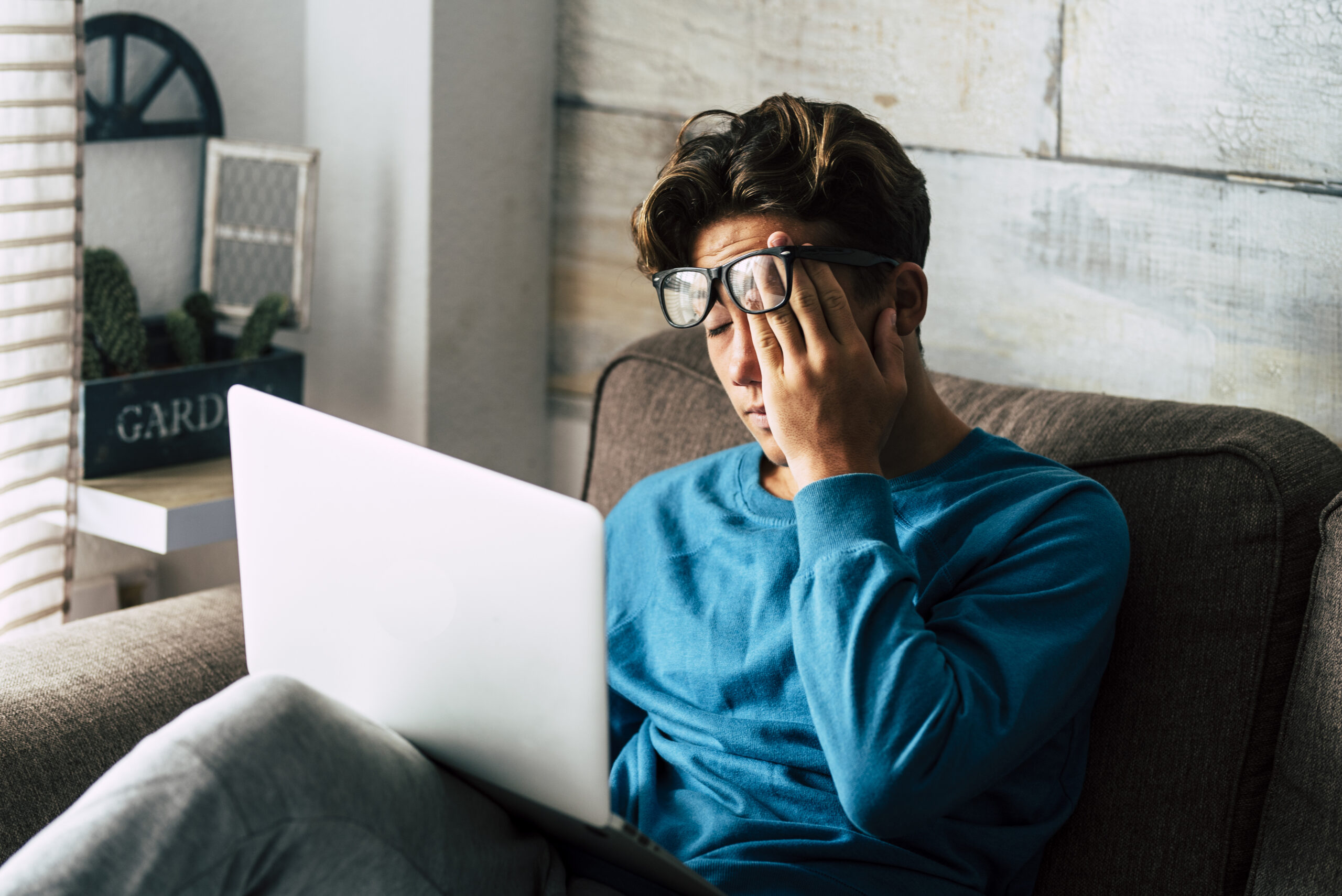Are your eyes feeling tired?
Looking at digital screens all day is a reality for many of us in today's world. While the convenience of technology is undeniable, the constant eye strain it can cause takes a toll. Here's where vocational lenses step in, offering a solution to combat screen fatigue and improve your work experience.
Vocational lenses aren't your average everyday glasses. They are specifically designed for optimal vision, personalised to your working distance and digital screen needs. This means clear vision, whether you're staring at your computer screen, reading reports, or collaborating across the table.
Traditional lenses might not be equipped to handle the constant near-focusing required for digital tasks. This can lead to eye strain, headaches, and blurred vision. Vocational lenses help alleviate these issues by providing a gentle focusing "boost" within the lens, allowing your eyes to relax and adjust more comfortably throughout the day.
Beyond improved vision, vocational lenses can also promote better posture. By optimising your visual comfort, you're less likely to slouch over your desk or crane your neck to see clearly. This can lead to improved body alignment and reduce body aches, contributing to an overall sense of well-being at work.
If you spend a significant amount of time working on digital screens, vocational lenses are an investment worth considering. They can offer a solution to:
- Reduce eye strain and fatigue
- Improve visual comfort at your working distance
- Promote better posture and reduce body aches
- Enhance your overall work experience
Book an appointment and talk to our team
See More, Do More: Explore the Possibilities of Smart Lenses
As we age, our bodies subtly change, and our vision is no stranger to this evolution. One common age-related shift is presbyopia, where focusing on close up objects like reading material or phone screens becomes increasingly challenging. While multifocal glasses have been the traditional remedy, smart lenses are emerging as a technologically advanced alternative.
Presbyopia: A Natural Progression
Presbyopia isn't a disease, but a natural consequence of age. Around the age of 45, the lenses in our eyes lose flexibility, making it harder to focus on near objects. This often leads to eye strain, headaches, and the frustration of reaching for the reading glasses we might have forgotten.
Smart lenses go beyond basic correction; they are technologically infused solutions designed to combat the difficulties of presbyopia. They seamlessly adapt to different distances, offering clear vision for both near and far objects. Here's what sets them apart:
- Multiple Zones: Unlike the visible lines of traditional multifocal lenses, some smart lenses have built-in zones within the lens, allowing your eyes to focus effortlessly on various distances.
- Light-Adjusting Power: Certain digital lenses take things a step further by automatically adjusting their focus based on the surrounding light, ensuring optimal vision in all lighting conditions.
- Personalised Touch: Advanced smart lenses can even be customised to your specific vision needs, offering a truly personalized experience.
Benefits of Smart Lenses:
- Clear and comfortable vision at all distances.
- Reduced eye strain and fatigue.
- Elimination of the need for multiple pairs of glasses.
- Improved quality of life for everyday activities.
Talk to our Team today to find out more.
7 ways to maximise your health fund benefit
Healthcare is a fundamental aspect of our lives, and it's essential to make the most of your health fund benefit. By doing so, you can ensure that you and your family receive the best care without breaking the bank. Here are seven tips to maximise your health fund benefit:
- Understand Your Policy:
The first step to getting the most out of your health fund is to thoroughly understand your policy. Different policies cover various services, so take the time to familiarise yourself with your specific coverage. This knowledge will help you make informed decisions regarding your healthcare needs.
- Waiting Periods:
Be aware of waiting periods for specific services. Most health funds have waiting periods for major treatments, so plan accordingly.
- Regular Check-Ups:
Preventive healthcare is a cornerstone of maintaining good health. Schedule regular check-ups and screenings, even if you feel well. Early detection of health issues can save you money in the long run by preventing the need for costly treatments.
- Consider Extras Coverage:
Extras coverage, often offered as an add-on to your basic policy, can cover services like dental, optical, and physiotherapy. It's worth exploring whether adding extras coverage is a cost-effective option for your specific healthcare needs.
- Opt for Gap Cover Insurance:
Gap cover insurance can help reduce or eliminate the out-of-pocket expenses associated with in-hospital treatments. It's a valuable addition to your health fund benefit that ensures you won't be burdened by unexpected costs during your hospital stay.
- Claim Smartly:
Keep track of your eligible expenses and ensure you claim for every eligible service. It's important to understand the waiting periods, annual limits, and any sub-limits that might apply to certain services to avoid any surprises when claiming.
- Review and Update Your Policy:
Your healthcare needs may change over time, and so should your health fund policy. Regularly review your coverage to ensure it aligns with your current requirements. This will prevent you from paying for services you don't need while potentially saving on those you do.
By following these seven strategies, you can make the most of your health fund benefit, ensuring that you and your family receive quality healthcare while keeping your financial well-being in check. Stay informed, be proactive about your health, and make the most of your health fund for a healthier, happier life.
Why you should wear sunglasses
Australia has some of the highest levels of ultraviolet (UV) radiation in the world, especially during the summer months. UV radiation can damage your eyes and lead to serious eye problems, including cataracts, macular degeneration, and pterygium.
Wearing sunglasses is one of the best ways to protect your eyes from UV radiation. Sunglasses should block at least 95% of UVA and UVB rays. They should also fit snugly to prevent light from leaking in around the sides.
Here are some of the benefits of wearing sunglasses in Australia during summer:
- Protect your eyes from UV radiation: UV radiation can damage the cornea, lens, and retina of your eyes. Wearing sunglasses can help reduce your risk of developing cataracts, macular degeneration, and pterygium.
- Reduce glare: Glare can make it difficult to see and can increase the risk of accidents. Sunglasses can help reduce glare and make it easier to see in bright conditions.
- Improve your comfort: Sunglasses can help protect your eyes from the wind and dust. They can also help reduce eye strain.
- Shielding Delicate Skin Around the Eyes: the sensitive skin around your eyes is prone to damage from sun exposure. Wearing sunglasses not only protects your eyes but also prevents premature aging and skin issues caused by UV exposure. It's like a double benefit for your face!
If you wear eyeglasses, you can get sunglasses with prescription lenses.
To find the perfect pair of sunglasses for your needs, visit our practice. We have a wide selection of sunglasses from leading brands, and our experienced team members can help you choose the right pair for your face shape and lifestyle.
Eye Strain and Screens: A Modern Dilemma
In today's fast-paced world, screens have become an integral part of our lives. Whether for work, education, or entertainment, we find ourselves constantly connected to smartphones, computers, tablets, and televisions. However, this digital revolution has brought an unexpected cost: eye strain.
Factors Contributing to Eye Strain
- Blue Light: Screens emit blue light that can disrupt our sleep-wake cycle, causing digital eye strain.
- Screen Glare: Reflections and glares force our eyes to work harder, leading to fatigue.
- Digital Device Usage: Prolonged use without breaks strains our eyes.
- Poor Lighting and Viewing Distance: Inadequate lighting and improper viewing distance contribute to eye strain.
Tips to Reduce Eye Strain
- Follow the 20-20-20 Rule: Take a 20-second break every 20 minutes to focus on an object 20 feet away.
- Proper Lighting: Ensure adequate lighting to avoid screen glare.
- Adjust Screen Settings: Reduce brightness and adjust contrast for comfort.
- Use Blue Light Filters: Consider using blue light filter apps or glasses.
- Maintain the Right Distance: Position screens at arm's length and eye level.
Prevention is key to avoiding long-term problems. Balancing screen time with breaks and outdoor activities can significantly improve eye health in this digital age. Prioritize eye care for a healthier and more enjoyable digital experience.
The Forgotten Winter Accessory
As the days get shorter and temperatures start to drop, it's easy to forget about the importance of wearing sunglasses. But don't let the cold weather fool you: sunglasses are just as necessary in winter as they are in summer. Not only do sunglasses protect your eyes from harsh UV rays, but they also provide many other benefits that are especially important during the winter months.
Sunglasses are important for protecting your eyes from the cold weather
Windy days and chilly temperatures can cause irritation, and sunglasses can help to protect your eyes by blocking out the wind. Additionally, sunglasses can help prevent snow blindness, a condition caused by exposure to snow's ultraviolet light.
Get the best out of it
Sunglasses are a great way to stay fashionable in the winter months. It's easy to get stuck in a rut of wearing the same hat, scarf, and coat every day, but a nice pair of sunglasses can help spice up your look. Whether you prefer classic aviators or fashionable cat eyes, sunglasses can be a fun and stylish way to add a little something extra to your winter wardrobe.
Grab your favourite pair of shades and head out into the cold—your eyes will thank you.
Why do my eyes get dry in winter?
Why do my eyes get dry in winter?
Winter is a time when many people suffer from dry eye syndrome. Dry eye can be a very uncomfortable condition, causing symptoms such as:
- Burning
- Stinging
- Redness
- Light sensitivity
- Blurred vision
For many people, winter is the worst time of year for dry eye as cold air, low humidity, and wind can exacerbate symptoms.
What are the treatments?
There are several treatments available to help manage dry eye. These include:
- Use artificial tears or eye drops to lubricate the eyes
- Increase the humidity of the environment
- Wear special glasses to block out the wind
In some cases, lifestyle changes such as avoiding smoking, reducing screen time, and wearing sunglasses may help reduce the symptoms of dry eye. In more serious cases, prescription medications or surgery may be necessary.
If you are suffering from dry eye, it is important to see your Optometrist for a proper diagnosis. Your Optometrist can help determine the underlying cause of your dry eye and recommend the best treatment for your condition.
Does my prescription need updating?
It is recommended to get an eye test once every two years, but during that time, it is possible that you perfect prescription may change. It can be difficult to notice the effects of an incorrect prescription, however, there are a few signs that your prescription may no longer be suitable for your eyes.
- Blurred Vision
This is the first and most obvious sign that your current prescription may not be working for you. If you are experiencing fuzzy or unclear vision while wearing your eyeglasses, it may be time for a new prescription.
- Your eyes feel tired
Eye fatigue can feel like your eyes are dry or you may interpret eye fatigue as needing to sleep. But it could be that your prescription is no longer accurate.
- Frequent headaches
Headaches are a symptom of many different things, which can make it hard to pinpoint the cause. If you are experiencing frequent headaches and wear glasses, it is worth checking that your prescription is still working for you.
If you are unsure if an incorrect prescription could be causing you issues, it is best to visit your optometrist to find out for sure.
Get Back to School Ready
Have you added an eye test to the list of back-to-school jobs? Approximately 80% of the primary school curriculum in Australia is delivered visually. Therefore, the ability for a child to see clearly is paramount to giving them their best education. There are some tell-tale signs that a child might be experiencing visual difficulties.
- Frequently rubbing eyes
- Complaining of tired eyes
- Sitting close to the TV or a book
- Closing one eye to see better
- Consistent incoordination
- Frequent squinting
If you have noticed any of these behaviours in your child, it might be time for an eye test. A children’s eye test can help to detect common conditions such as:
Myopia: A Condition in which objects that are near appear clear, and object farther away look blurry.
Amblyopia (lazy eye): Reduced vision in one eye.
Convergence insufficiency: Can cause blurry and double vision
The optometrist will also test for issues in binocular vision, focusing, eye tracking and colour vision. Book an appointment with us today to get your children's eyes tested!
Get Back to School Ready
Have you added an eye test to the list of back-to-school jobs? Approximately 80% of the primary school curriculum in Australia is delivered visually. Therefore, the ability for a child to see clearly is paramount to giving them their best education. There are some tell-tale signs that a child might be experiencing visual difficulties.
- Frequently rubbing eyes
- Complaining of tired eyes
- Sitting close to the TV or a book
- Closing one eye to see better
- Consistent incoordination
- Frequent squinting
If you have noticed any of these behaviours in your child, it might be time for an eye test. A children’s eye test can help to detect common conditions such as:
Myopia: A Condition in which objects that are near appear clear, and object farther away look blurry.
Amblyopia (lazy eye): Reduced vision in one eye.
Convergence insufficiency: Can cause blurry and double vision
The optometrist will also test for issues in binocular vision, focusing, eye tracking and colour vision. Book an appointment with us today to get your children's eyes tested!









